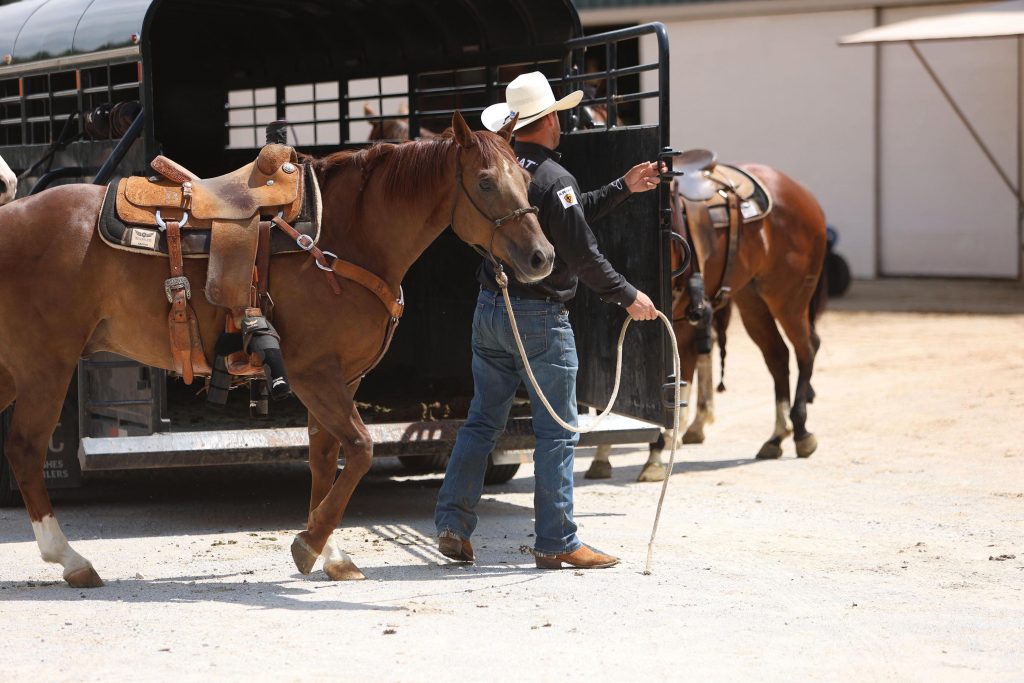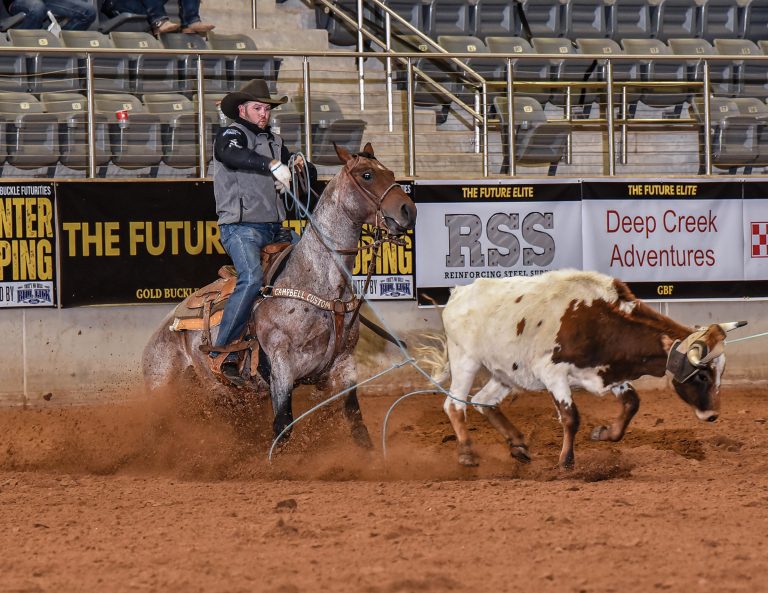As a reader of The Team Roping Journal, it’s a fairly safe assumption you’ve got more than a few miles—and probably a few stories to go along with them—tallied up in your horse-hauling log. Nonetheless, with the bulk of the summer miles ahead, the time to make sure you and your rig are ready is now.
Stats and facts from the road
According to USRoper—a premier roadside assistance program designed specifically for ropers—there are 70 million vehicle breakdowns in the United States each year, which equates to one in every three drivers. If you spend enough hours hauling horses, it may only be a matter of time before you come face-to-face with a breakdown while loaded.
Annually, the USRoper call center, which answers more than 10,000 calls for roadside services a year, dispatches help nearly 2,200 times to people with their horses in tow—more than 20% of their total calls. Since 2018, the company has provided assistance to tens of thousands of drivers in need of fuel delivery, tows, mechanical solutions, tire changes and blowups, lockouts, jumpstarts and more.
In short, the challenges of the road are numerous and, while a truck breaking down is aggravating, facing roadside difficulties with horses on the trailer is a whole other level of stress.
Here and now, The Team Roping Journal presents a new series on truck and trailer know-hows and must-haves to streamline travel and minimize trouble. In the first installment, we cover truck and trailer necessities and a ‘pre-flight’ checklist. Then, the pros share hard-earned testimonies after having dealt with truck and trailer problems firsthand.
Horse-hauling checklist: In the truck
When packing the trailer for a trip—both near and far—putting safety necessities in the truck is often put lower on the “to-do” list. However, keeping the truck stocked with paper maps, phone chargers and comfort items for people (i.e. water, snacks and layers of clothing) comes in handy when plans go awry.
✔ Flashlights
This seems self-explanatory, but it gets very dark in rural parts of the United States at night. The more lumens a flashlight is rated, the brighter it’ll be to examine a blown tire or other issue.
✔ Phone Battery Bank
Phone chargers are a given, but power banks are handy when trucks encounter battery or alternator troubles that leave drivers unpowered and low on phone charge.
✔ Jumper Cables
Even with roadside assistance available, some problems—like a dead battery— are easy to handle with the right tools. Jumper cables get ropers back on the road quickly.
✔ Necessary Oil, Fluids & DEF
Keeping the towing vehicle’s oil, transmission fluid, coolant and DEF (if applicable) on hand is a simple solution to warning lights for low levels.
✔ First Aid Kit for Humans
Roping comes with its fair share of burns, cuts and, sometimes, missing thumbs. Keep a generic kit of medical supplies including antibiotic ointment, sterile gauze, medical tape, sterile gloves, tweezers, thermometer, antihistamines and anti-inflammatory medicine.
✔ Proof of Insurance
Hustling to the next rodeo? Make sure there is up-to-date proof of insurance in the vehicle in case a state trooper is out prowling. In recent years, insurance companies have upped their app game, too, which means cards can be accessible at the tap of your finger … if you have service and a charge—better to download a copy before heading out, just in case.
✔ Tow Straps
Chains can work in a pinch, but tow straps are the safer option for pulling stuck vehicles out of a muddy field at a roping. Please know that either can snap when employed and recoil with actual deadly force. Clear the area of bystanders. Some tricks, like putting a horse blanket over the front and rear windshields of the stuck vehicle and the tow vehicle, respectively, or weighting the straps in strategic places may prohibit a fatal blow, but calling for professional help is the optimal choice when the tow job is serious.
Tips from the pros

➡ “We keep an impact gun and sockets—making sure we have the correct size—jumper cables, tire ramp and electrolytes, especially for longer trips to keep them drinking.” —Preston Brown, Relentless Remuda Professional Driver
➡ “OE has a good assortment of things your horse may need in case of an emergency, and we keep dex, banamine and ace in the trailer as well. The ace is in case the get stressed out being alone or if there are fireworks at a perf.” —Tyler Wade, 5X NFR Header
Horse-hauling checklist: With the horses
Transporting 1,200lb animals with a habit of hurting themselves isn’t for the faint of heart, but a truck and trailer full of supplies makes unexpected events easier to handle.


✔ Water Supply
The rule of thumb for hauling horses is to have at least 24 hours of water for all animals on board in case of an emergency. Large, plastic water totes made for trailer hay pods or tack room corners are available, but five-gallon plastic jugs from camping supply stores work, too.
✔ Hose
Hoses are always handy. Spiral and expandible hoses save on space and can be stored in an empty water bucket when not in use.

✔ Buckets
Water buckets are necessary items in every trailer. Aside from providing fresh water, they can hold grain, and serve as a seat on an impromptu pitstop.
✔ Pitchfork
In the event a breakdown happens, a horse may be staying the night somewhere unplanned with unknown amenities. Having a pitchfork will help keep manure managed—which is essential for cleanliness, keeping flies at bay and showing respect to the facility owners.
✔ Health Papers & Brand Inspections
In some states, papers are required if you’re traveling anywhere beyond a certain mileage radius, so carrying paperwork is recommended regardless of whether you’re crossing state lines. Make sure up-to-date papers for every horse are easily available.

✔ First Aid Kit for Horses
Horses will find ways to be injured, and having a first aid kit on board is a must. Vet wrap, gauze, needles and syringes, a twitch, thermometer, super glue for stitching, bute, banamine, farrier tools and Epsom salts are a few items to begin building a kit.
✔ Extra Halters and Leads
When the unfortunate happens, halters can break or need to be cut. One can never have too many extra halters.
Tips from the pros
➡ “I have every drug on the trailer you can possibly imagine like bute, banamine, dex and ace. I keep SMZs in case one gets sick, and lots of wraps and stuff to sweat legs if I need it. I keep an impact to change a tire, and I have the normal stuff—a socket set, the tire ramp, and a four-way because sometimes you need both. I keep a block of wood in the bed of the truck to put my jacks on, and buckets and hay bags because I’m not a cube guy.” — Travis Graves, NFR Average Champion Heeler
➡ “I always make sure I have a horse, saddle, boots and a hat because nobody wears my tiny size. For the vet supplies, I keep banamine, ace and electrolytes.” — Spencer Mitchell, 2X NFR Header
Horse-hauling checklist: For the trailer
Having the proper supplies is step 1. Knowing where to find them in an emergency is Step 2. From Yeti load-Out Boxes to Professional’s Choice Trailer Caddies, dial down your organization system as part of your road safety preparedness.

✔ Spare Tire & Appropriate Lug Wrench
Trailer drivers need at least one spare tire and, if it’s a triple axel, having two spares is advisable.
✔ Trailer Jack or Drive-up blocks
Fact: Tires blow. With a heavy duty-jack or drive-up block on board (pay mind to weight recommendations when purchasing), a tire change can be no more eventful than a slight nuisance.
✔ Tire Gauge
Inexpensive tire gauges can be purchased at just about any gas station or auto part store. Checking tire pressure before—and throughout—the trip is advised to avoid slack tires.
✔ Wheel Chocks
Broken down on a hill or parked somewhere questionable at the crowded jackpot? Wheel chocks are the answer. Chock on the downhill side in the center of the tire.
✔ Fire Extinguisher(Truck & Trailer both)
Moving wheels, axles, combustion engines and general heat that comes with road travel means things can catch on fire. Having one fire extinguisher for the truck and one for the trailer is non-negotiable.
✔ USRoper Membership
USRoper is an equine roadside service that will handle anything from locked keys in the truck to tire changes and towing the heftiest of rodeo rigs. Members have peace of mind that the U.S.-based, top-rated customer service team will get problem trucks and trailers, plus horses, off the side of the road. It’s important to note that, while other well-known roadside assistance services like AAA can also take care of your truck and trailer, they will not assume care for your horses.
✔ Safety Flares and Cones
Broken down on the side of the road in the dark is an unwelcome risk. Reflective safety triangles and road flares are vital to increasing your chances of being seen and preventing a bad situation from evolving into a terrible situation.
✔ Carbon Monoxide Detector
Carbon Monoxide is a silent killer, and a living quarter trailers with an improperly vented generator can result in fatalities. Installing carbon monoxide alarms in both the living areas and the horse areas of a trailer is a no-brainer lifesaver.
✔ Odometer Log with Maintenance Details
Record generator servicing, tire replacement and other general truck and trailer care for helpful future reference and increased resale value.
Tips from the pros
➡ “Hope Thompson and I broke down running late to San Antonio in 2022 with four horses on the trailer. We were in a bind—until we remembered we had USRoper.
“When we called, the customer service team immediately asked if our horses were safe, and they had us back on the road within an hour. That saved us from turnout fees and missing out on thousands of dollars—and now we never forget that USRoper is there.
“We’ve used it to help us everywhere from the mountains of the Northwest to downtown Corpus Christi. And now I make sure everyone I’m traveling with has the service, too. Because it’s just not worth being on the road without it.” — Lari Dee Guy, 6X WPRA Team Roping World Champion
Pre-trip checklists
Truck
• Check all tire pressures
• Check tires for suspicious wear
• Ensure brakes are in good condition
• Check truck fluids and oil are at a good level
• Turn on tow/haul mode
On the trailer
• Check all tire pressures
• Check tires for suspicious wear
• Ensure the hitch is locked on the ball with the correct size ball
• Connect safety cables and chains
• Plug and secure electrical connection
• Ensure all trailer lights are in working order
• Connect emergency breakaway system
• Check the emergency is battery charged TRJ











